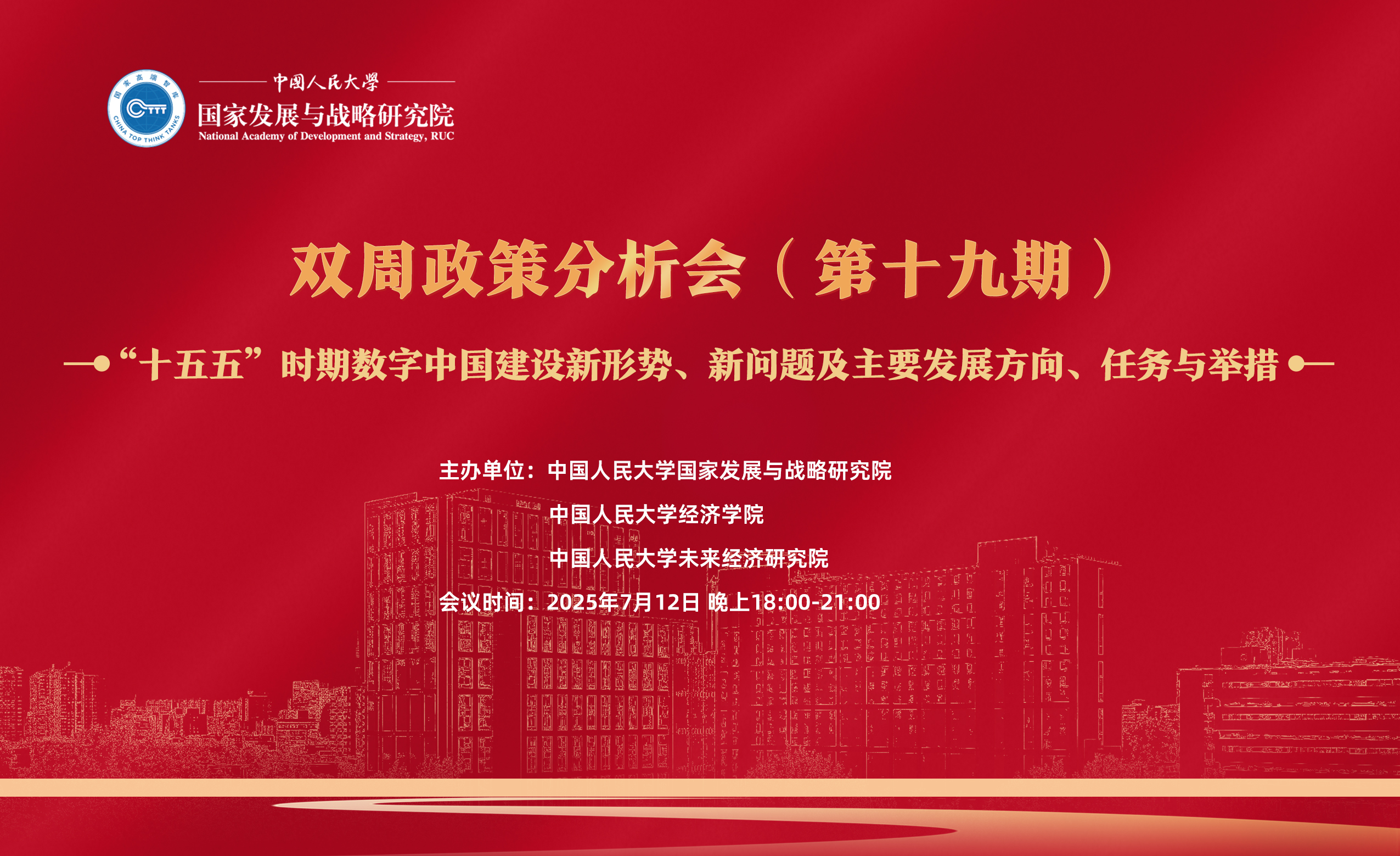 Research Update
Research Update
25
Jul
To comprehensively assess the trends, challenges, and tasks of building Digital China during the 15th Five-Year Plan period, the 19th Biweekly Policy Analysis Meeting titled “New Trends, Emerging Challenges and Key Development Directions, Tasks, and Measures for Building Digital China During the 15th Five-Year Plan Period”, was held on July 12, 2025. The event was co-hosted by the National Academy of Development and Strategy of Renmin University of China, the School of Economics, and the Institute for Future Economic Studies.
Professor LI Sanxi, Research Fellow at the National Academy of Development and Strategy, Deputy Dean of the School of Economics, and Director of the Digital Economy Research Center, chaired the meeting. Experts and scholars from the State Information Center, Chinese Academy of Social Sciences, China Academy of Information and Communications Technology, and various universities participated in in-depth discussions on the meeting’s theme.
Experts noted that the 15th Five-Year Plan period (2026–2030) is a critical phase for building Digital China. As a national top-level strategy overseeing fields such as the digital economy and digital society, the planning for Digital China must consider both complex international and domestic environments. Internationally, competition in technology and rules is intensifying, and China faces challenges including technological blockades and market barriers. Domestically, as the economy enters a stage of high-quality development, digitalization is needed to foster new growth drivers, while rapid technological iteration also brings both opportunities and risks.
Experts recommended that the 15th Five-Year Plan should focus on the following tasks. First, seize the opportunity of artificial intelligence as a core driving force, plan for the new technological revolution, and pay close attention to AI’s impacts on employment, security, and ethics. Second, advance the market-oriented allocation of data elements as a priority reform task. Through “technology + institutional” innovation, address issues related to data ownership, circulation, distribution, and security governance. Experts suggest granting the National Data Administration overarching coordination authority in this area. Third, promote digital transformation with tailored, sector-specific approaches. Pay attention to challenges such as the “information silo” in manufacturing and mismatches between investment and output in some industries, to avoid blind or excessive investments. Fourth, balance development with security and fairness. Experts recommend prudence in promoting AI substitution in labor-intensive sectors and call for improving redistribution mechanisms, including education and social security systems, to mitigate the impacts of technological disruption. Fifth, enhance international competitiveness and governance capabilities in the digital domain and actively participate in the formulation of international digital rules.
Finally, experts proposed establishing an evaluation and assessment mechanism for Digital China construction, incorporating digitalization achievements into the performance evaluations of local government officials and executives of state-owned enterprises, to ensure that the Digital China strategy is effectively implemented at the grassroots level.
(The above views are compiled from the statements made by participants at the 19th Biweekly Policy Analysis Meeting held on July 12, 2025. It is intended solely for academic exchange and does not represent the views of the National Academy of Development and Strategy, Renmin University of China.)
Proofreaders: LI Sanxi, ZOU Jingxian
Translator: ZHANG Yuqing
Web Editor: ZHANG Jingjing
The “Biweekly Policy Analysis Meeting” is a high-level policy research and exchange platform established by the National Academy of Development and Strategy (NADS) at Renmin University of China. Its aim is to promote the development of NADS as a top-tier think tank characterized by a “new platform, extensive network, interdisciplinary integration, innovation-driven and high output” model through comprehensive research, analysis, and evaluation of public policies. By bringing together high-quality resources from within and outside the university, including those from government, industry, and academia, the platform strives to offer “Renmin University’s perspectives” on major policy issues across fields such as politics, economy, society, culture, ecology, law, and foreign affairs.